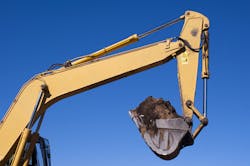Since joining Power & Motion, I have had the opportunity to learn more about hydraulic systems and the various aspects which go into a well performing system. While I had knowledge of hydraulics, the more I've dug into the industry the clearer it's become that there is a lot yet to learn.
For instance, although familiar with hydraulic fluids I have recently had opportunities to dive deeper into just how valuable they are — and how they are sometimes an overlooked aspect of hydraulic system designs. Not only can selecting the appropriate hydraulic fluid ensure proper lubrication but also efficiency and other desirable performance aspects.
READ MORE: Don’t Let the Wrong Hydraulic Fluid Slow You Down
"When you improve efficiency through the proper selection of fluid, you have more flow to do work. And you have more torque to move the machine, especially when it's working at high intensity," said Paul Michael, Fluid Power Institute Director, Milwaukee School of Engineering (MSOE) and a member of the Society of Tribologists and Lubrication Engineers (STLE), during a webinar with Power & Motion.
Michael went on to say hydraulic fluids are unique because they are the transmission medium for fluid power and unlike any other lubricant, their properties determine the efficiency of the hydraulic system. Therefore, choosing the right hydraulic fluid is as important as designing the system itself.
The need to consider hydraulic fluids as a critical component was also emphasized by Stephen Gotheridge, technology development manager, Industrial Oils at Lubrizol, in a recent interview with Power & Motion on the subject of hydrolytic stability — a hydraulic fluid’s capacity to withstand or resist chemical decomposition when exposed to water.
As Gotheridge noted, water is a common contaminant in hydraulic fluids and can cause a variety of issues which impede the performance of a hydraulic system.
So how does one go about selecting the right fluid? Understanding the application in which the hydraulic system and its fluid will be used is key. If, for instance, it will be used in a wet environment, it is important to choose a fluid which is capable of shedding water known as a demulsifying fluid. These are the mostly commonly used and specified fluids in the hydraulics industry, said Gotheridge, but understanding how well they are able to withstand exposure to water will help to ensure the performance and longevity of a system.
Viscosity and temperature operating windows are necessary factors to consider as well when selecting the appropriate hydraulic fluid for an application. During the webinar with Power & Motion, Michael pointed to a study conducted by MSOE in which the viscosity requirements for pumps and motors were assessed. The research team found the safe operating viscosity — those which help ensure machines will not be harmed if using a particular fluid — is between 13 and 860 cSt which correspond to various viscosity grades of oil.
He said the most common viscosity grade in hydraulics is ISO Grade 46 followed by Grades 32, 68 and 15. Operating oil temperatures typically determine which grade is best for an application. ISO Grade 15, for instance, is commonly used for applications with lower operating temperatures, ranging from -23 to 44 C, such as utility bucket trucks and aviation.
Grades 32, 46 and 68 are common in most off-highway and industrial equipment applications, said Michael. Their suitable operating temperature ranges are:
- Grade 32 = -8 to 64 C
- Grade 46 = -2 to 73 C
- Grade 68 = 4 to 84 C
By selecting the right grade, you can ensure the performance of your system and even improve the efficiency of the hydraulic system, leading to overall machine efficiency gains. Use of what is considered to be an energy efficient hydraulic fluid can help to reduce flow losses, leading to the availability of more flow to do work.
While these are by no means the only aspects to keep in mind when selecting a hydraulic fluid, they demonstrate the various criteria which should be kept in mind and how they could benefit a system. So the next time you're working on a hydraulic system, be sure to place as much emphasis on choosing the right fluid as you would a seal, sensor or other vital component.
We want to hear from you!
What are some of the key aspects you consider when choosing a hydraulic fluid? How have you seen performance be negatively impacted when the wrong fluid is chosen? What trends are you seeing in hydraulic fluid formulations?
Let us know! Email me at [email protected] or reach out to us on social media.
Twitter: @TechnlgyEditor or @PowerMotionTech
LinkedIn: @PowerMotionTech
About the Author
Sara Jensen
Executive Editor, Power & Motion
Sara Jensen is executive editor of Power & Motion, directing expanded coverage into the modern fluid power space, as well as mechatronic and smart technologies. She has over 15 years of publishing experience. Prior to Power & Motion she spent 11 years with a trade publication for engineers of heavy-duty equipment, the last 3 of which were as the editor and brand lead. Over the course of her time in the B2B industry, Sara has gained an extensive knowledge of various heavy-duty equipment industries — including construction, agriculture, mining and on-road trucks —along with the systems and market trends which impact them such as fluid power and electronic motion control technologies.
You can follow Sara and Power & Motion via the following social media handles:
X (formerly Twitter): @TechnlgyEditor and @PowerMotionTech
LinkedIn: @SaraJensen and @Power&Motion
Facebook: @PowerMotionTech

Leaders relevant to this article:


